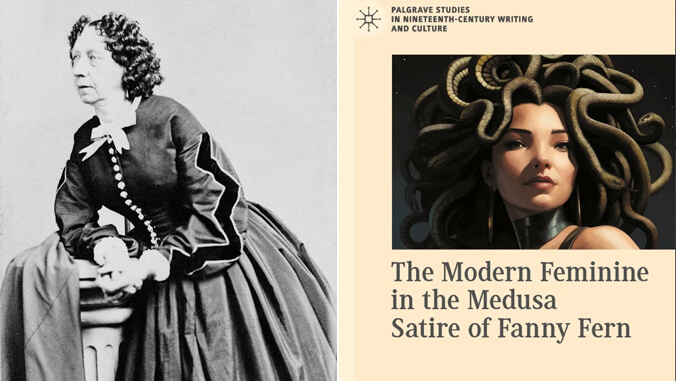
Digging into 19th-century newspaper archives, James Caron, professor emeritus from the University of Hawaiʻi at Mānoa’s Department of English, recovered a literary treasure trove: the weekly columns of Sara Parton, known as “Fanny Fern,” who became America’s most highly-paid woman columnist. From the 1850s to the 1870s, Parton captivated readers with her keen insights and satirical takes on social issues, especially domestic life and gender expectations.
“She’s fearless, she’s absolutely fearless,” explained Caron. “She could be very sharp, even aggressive, with her wit. Some people at first thought that she was a man.”
For example, she has this to say about a proper woman:
- “I’m not speaking of those doll-baby libels upon womanhood, whose chief ambition is to be walking advertisements for the dressmaker; but a rational, refined, sensible woman, who knows how to look like a lady upon small means.”
Caron, fascinated by Fern’s clever wordplay, delved deep into her early newspaper writings and unpublished works. He recently published The Modern Feminine in the Medusa Satire of Fanny Fern (2024), which celebrates Fern as a foundational figure in a lineage of feminist satirists.
During his 36-year tenure at UH Mānoa, Caron often incorporated Parton’s writings into his courses on American humor.
Everybody laughs
Caron, a passionate fan of satirical literature, draws inspiration from literary giants like Mark Twain, who used satire to humorously critique society.
“I started with an interest in folk stories and tall tales before the Civil War, then Mark Twain, and then any funny things that people wrote,” Caron explained. “Because everybody all around the world, everybody laughs. All cultures tell stories that make people laugh; it’s very, very human.”
He has authored previous books exploring satire’s role in shaping public discourse: Satire as the Comic Public Sphere: Postmodern ‘Truthiness’ and Civic Engagement (2021) and Mark Twain, Unsanctified Newspaper Reporter (2008).
- Related UH News story: English professor examines contemporary satire, June 1, 2021
“Satire has a long-standing effort, all the way back to the Greeks and the Romans, to try to make the public sphere a better place,” Caron said.
The Modern Feminine in the Medusa Satire of Fanny Fern can be found at the Palgrave Macmillan website and on Amazon.

